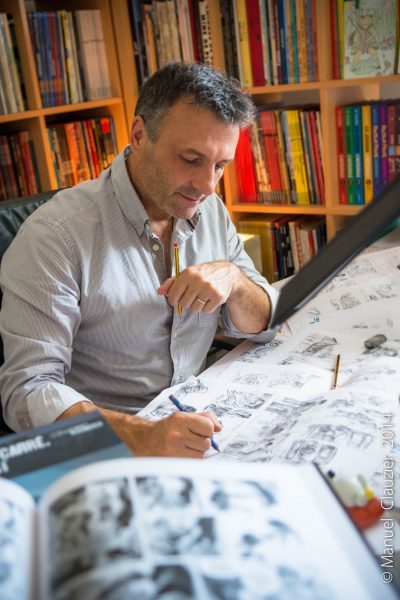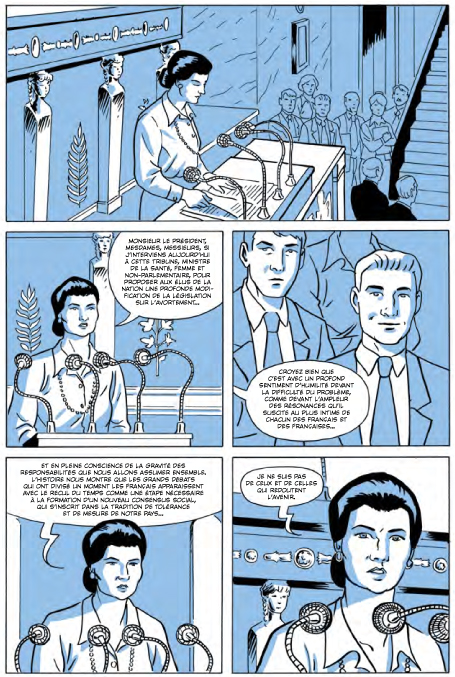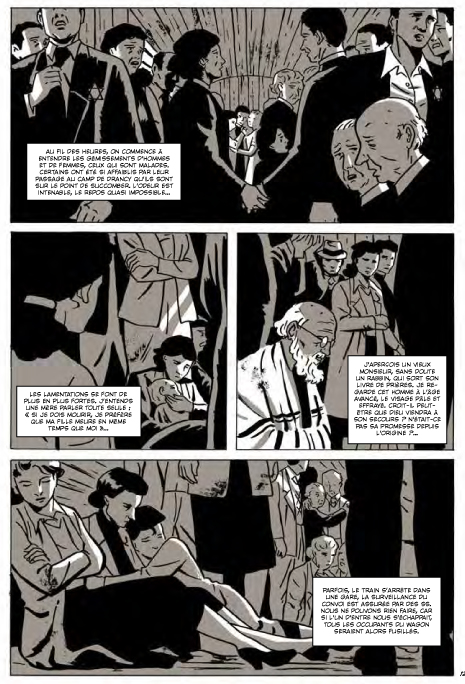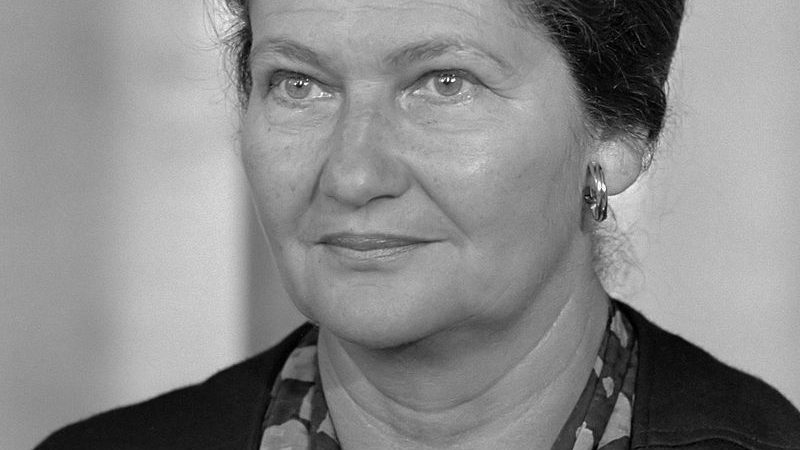On July 1, 2018, human rights legend Simone Veil will be inducted into the prestigious Panthéon [2] mausoleum along with her husband Antoine Veil. An essential figure in modern French history representing civil society, she is a survivor of the Auschwitz [3] concentration camp who went on to become a leading women's rights defender and the first president of the European Parliament.
Shortly before the national ceremony of recognition at the Panthéon, Global Voices interviewed Pascal Bresson, a graphic novelist with more than 40 titles to his credit, who just completed a graphic novel based on the life of Simone Veil. The following is the narrative of our conversation exploring the meaning of Veil's legacy in the current political context as well as Bresson's current work.

Cover design of a new graphic novel “Simone Veil, L'immortelle” by Pascal Bresson
Global Voices (GV): Your work, “Simone Veil, L'immortelle,” [“Simone Veil, the Immortal” in English. Ed's note: Immortal refers to member of the French Academy [4]] will be released June 27, 2018, by Editions Marabulles [5]. Can you tell us about the context of this work and about your inspirations for the novel?
Pascal Bresson (PB): With great pleasure. This is the very first graphic novel authorized by the Veil family. I have been working on this project for more than three years. After visiting the Panthéon in 2014, and I have to say that, since I was a child, I have always had an admiration for these great people who have done something good for our country, upon seeing all those tombs: Zola, Jean Jaurès, Victor Hugo, Marie Curie, Jean Moulin, Aimé Césaire, etcetera, I wondered who could be the next person inducted there!
Immediately, Simone Veil seemed obvious to me. A woman who was humanist, independent, and uncompromising in her convictions, with fighting spirit and moral conscience. A strong person, whose destiny was both tragic and exceptional. Beyond her image of rectitude and honesty, Simone Veil was, first and foremost, a woman who embodied her era and her struggle. Her personal story was intimately entwined with collective history: the war, the hell of the extermination camps, abortion law, the fight for women's rights, and commitment to the reunification of Europe. It has to be said that it's fascinating and intriguing.
Through these 176 pages, I unveil the mystery surrounding the exemplary journey by which she became an icon, a symbol for generations of women. Drawing upon her own testimonies, I retrace the itinerary of a smart and rebellious little girl, born in Nice on July 13, 1927, as Simone Jacob. I bring to light a behind-the-scenes view of her political battles, her wounds, and the suffering which tinged her life. Neither a hagiography nor a pamphlet, this book, intended for readers seven to 77 years old (and up) is by a passionate author who depicts, for the first time ever in a graphic novel, an essential figure of our times.
GV: Simone Veil is certainly an emblematic character in French history. However, most of her work is still not well-known to the general public. If you had to summarize, in a few sentences, why Simone Veil is now in the Panthéon, what would you most like to present from her story?
PB: Her best-known book is definitely “A Life”. The general public is well-aware of her fight in 1974 for a woman's right to choose abortion, but on the other hand, throughout her life, she also was ceaselessly waging other battles. Like her success in having Algerian prisoners who had been subjected to abuse transferred to France, she obtained political asylum for thousands of members of the FLN [6] [National Liberation Front of Algeria] who were interned in France. But the biggest fight that she led was against the National Front to end the battle for Europe, which is inseparable from our memory of the Second World War.
And now, Simone Veil will enter the Panthéon on Sunday, July 1, 2018. There she will rest in the company of her husband Antoine Veil, who died in 2013. This is the first time that any man will make entry to the Panthéon in the role of spouse. In that regard, I have a small anecdote on the subject! The first time that I met Simone Veil and her son Jean, I remember telling him that it's important for his mother to go to the Panthéon. And he burst out laughing, saying: ‘Oh, if someday mom goes to the Panthéon, my dad will have to follow her there’.
Simone Veil will be the fifth woman to be laid to rest in this symbolic location. This will be a beautiful way to show the immense gratitude of the French people. She deserves to enter this temple of the Republic. While remembering that, in 1974, her husband Antoine stepped aside, to let his wife become Minister of Health. It was he who had been destined to become a politician, not her. He sacrificed himself through his love for her. He didn't want to overshadow her. They were a symbiotic couple. And, at the least, they will rest together eternally and never be separated again.

The author Pascal Bresson, used with his permission.
GV: You've been an author of graphic novels for 25 years, in which you have covered subjects such as humanism, tolerance, segregation, racism, injustice, and the duty to remember history. Currently, the world is still filled with situations which seem unjust, or even cruel. How do you see your role as an author in the world today, and what unjust situations, in particular, would you like to see resolved in the future?
PB: In life, there are two feelings which I dislike most of all: injustice and mediocrity. Sometimes the two go together. The injustice is really repugnant to me. In recent years, I have specialized in areas such as humanism, justice, society, racism, or ecology. I became an author engaged with our times. And it's not coincidental that my favorite author is Victor Hugo [7].
The question of the role of a writer in society today is more pertinent now than ever. I'd like to be a mediator in society, not just a spectator, but in an active role to describe, critique, analyze everything good or bad which is happening in our society.
An author has the role of guardian and conveyor of memory. Some observations on life are recorded on paper, so that they will endure time. Writing has always had some therapeutic value for me. By writing, you can help yourself and help others. But writing is also a way of expressing states of mind, and the funny, aggravating, or frivolous aspects of life. Writing can also be an essential educational tool. I want to be the one who collects facts, shapes them, and puts them on paper, it's a kind of transmission. I'm an emissary.
We have to keep faith in humanity. When I see human cruelty, it's heart-wrenching but I have to keep going. I'm still convinced that the future for humanity will be women. ‘The future of man, is woman’, as Louis Aragon [8] said. And like the famous poet, there are numerous other great men who have affirmed that without the support of the women in their lives, their professional rise would have been different. Our epoch is still struggling to think of the ideas of equality and difference conjointly. It's very important to reconnect with a unique French tradition of relations between men and women as peaceful and complementary.

Excerpt from the illustrated novel “Simone Veil, L'Immortelle”
GV: One of your graphic novels “Plus Fort que la Haine“ [9], published by Editions Glénat, received the “Readers’ Choice Prize for Best Work 2015″, in the European comic category. It tells the story of Doug Wiston, a young black worker in New Orleans in 1933, in an America scourged by racism and segregation. The presidential agenda of [Donald] Trump in the USA [United States of America] seems reminiscent of these dark days of segregation. How would you explain this resurgence of racism in the USA, and to some extent the world in general?
PB: Racism and segregation are two subjects I have often covered. In a general way, it seems that racism today arises from fear and worry when faced with someone different than oneself, and who one can't understand. Returning to the subject of my book ‘Plus Fort que la Haine’, one might say that the blows just keep falling upon the head of young Doug, the hero of the story, who will have to learn to control his revolt, to tame and to channel it. Meanwhile, the injustices keep accumulating for him, for his family, and for others like him. His salvation will come in the form of intervention by two wise men, one black, who stops him from making an irreparable mistake, and the other white, his neighbor who gives him his first pair of boxing gloves, and a ticket to go to the city. A humanist tale in an America scourged by racism and segregration, which proves that no matter what happens, hatred is never the answer…

Excerpt from the illustrated novel “Simone Veil, L'Immortelle”
GV: Let's go back to your forthcoming work. You got permission from the family of Simone Veil to do this novel. Madame Veil, in her time, had to face an outpouring of antipathy for her work to promote women's rights, especially concerning the right to choose abortion. Is it more difficult nowadays to advance progressive causes than it was in 1974? And is it possible we could even turn back on the progress made regarding the rights of women?
PB: In 40 years, French citizens have clearly changed their opinion about the legal status of abortion. Seventy-five percent of them say they approve of having no restriction on abortion, versus only 48 percent in 1974, the year of the ‘Veil law [10]‘ [legalizing abortion in France [11]]. And one could add Chile to the list of nations which are finally easing their laws about abortion. In Latin America or in Africa, certain countries prohibit abortion, and some permit it only under very restrictive conditions. It's women in Europe and North America who benefit from the most lenient laws. In practice, abortion is still strictly limited in some countries. In fact, doctors can cite ‘conscientious objection’, which allows them not to do any act contrary to their ethical, moral, or religious convictions.
This is not a sudden return of reactionary waves, it is more a state of mind, an opening of the mind. A significant number of countries continue to allow it only under restrictive conditions. Especially in the case of danger to the life of the mother. On the other hand, for many of those who oppose it, the problem that arises is this: who will decide, and on the basis of which criteria? Who will decide when there is human life, or when there is nothing, or almost nothing?
Women have the right to the disposition of their own bodies as they wish. ‘I did not imagine the hatred that I was going to incite,’ said Simone Veil, on November 26, 1974. Since then, the opinion of the French people on the conditions of abortion has changed in a very significant way. It can be seen that in today's France, there is no real gender or age breakdown in opinion on the conditions of voluntary termination of pregnancy. In fact, men and women are both equally in favor of extensive authorization of abortion.
GV: You are passionate about justice and about the ocean. I couldn't forget to mention the tragic episode [12]of the Aquarius [ship sinking] and the refugees in the Mediterranean Sea. What is your take on the current situation of refugees crossing the Mediterranean Sea, and how could this be improved?
PB: If Simone Veil were still alive and well, I can promise you that she would be pounding a fist on the table! It's a shame. This great lady, a true European, would never have allowed the sad situation we are living in to have happened. Since it's fair to say it's a shame to Europe as a whole.
Obviously, I'm just reacting as a human, as a citizen, and it is perhaps too easy to write these lines from where I am. But one still has to recognize that there is total disorder — visible incoherence — in the absence of common rules, it's a terrible everyday fact. Each country does as it likes, accepts or rejects whom they wish, even if that means sending some toward certain death. That already began with the arrival of the Syrians. While each European country had committed to a minimum reception quota for those who fled Daesh [13] (also known as ISIS), most countries did not respect it, and especially not France. The number of people who are dying in the Mediterranean is a considerable humanitarian disaster, and yet Europe has still not been able to stop it.
All of that is scary for the future, especially for the future of our children. How can we show them a good example of cooperation? It shows the extent to which Europe has lost its moral compassion in the Mediterranean situation. These men, women, and children have fled poverty and war. I have to admit that I'm overwhelmed by this behavior. How will this situation evolve? I dare to hope that mentalities will evolve, but I also have a tendency to think humanity may be regressing.
Because, to be human is to be dignified and respectful, to think with intelligence, to share with others. To be human means to be free in the midst of a civilized society […] But all of these ways in which I have tried to characterize humanity are in regression in everyday life. For the future, I have a lot of hope.
